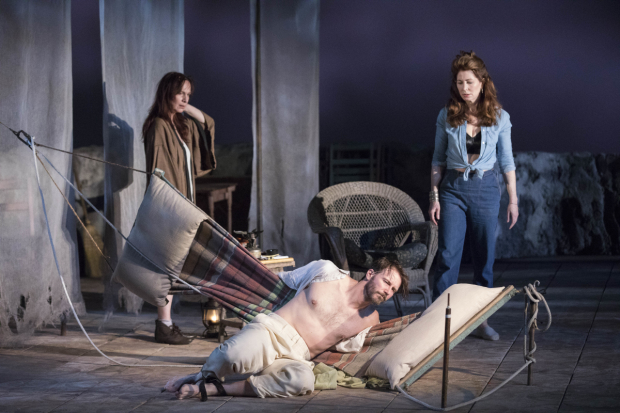The Night of the Iguana

(© Gretjen Helene Photography)
Frequently cited as Williams' last critical and commercial success, The Night of the Iguana, now running at American Repertory Theater, covers the same kinds of themes present in earlier works like The Glass Menagerie and A Streetcar Named Desire. No playwright has better encapsulated the plight of the tormented soul than Williams, and rarely has the devil seemed more divine or God more wicked as on the veranda of the Costa Verde Hotel, a cliffside resort in the Mexican forest, where Iguana unfolds.
Reverend T. Lawrence Shannon (an intensely scintillating and a little too manic Bill Heck) is a defrocked Episcopalian minister forced to leave his Virginia church after being accused of fornication and heresy. Now working as a tour guide in Mexico in the summer of 1941, Shannon is embroiled in another scandal when his current tour party, a group of Baptist women from Texas, led by the imposing Judith Fellowes (a sensational Elizabeth Ashley), discover he has slept with the underage Charlotte (Susannah Perkins), a student on the tour.
Shannon and his tour party end up at the rundown Costa Verde hotel, run by his old friend, the lusty and good-humored and newly widowed Maxine Faulk (Dana Delany). Desperate to outrun the consequences that lie ahead (Fellowes has phoned Texas in an attempt to have a warrant issued for Shannon's arrest for statutory rape), Shannon hopes to find a brief respite at Costa Verde. To buy himself some time, Shannon takes the key to the tour bus, stranding the guests at the hotel for the time being.
Enter Hannah Jelkes (a revelatory Amanda Plummer), a spinster artist from New England, and her grandfather, Nonno (James Earl Jones, in a commanding but brief performance), supposedly the "oldest living poet." Plummer speaks in hushed but accented tones, a nearly melodramatic daffiness that subtly reveals both her inner tumult and her almost saintlike grace. There is an immediate magnetism between Hannah and Shannon; they see each other in a way that neither has experienced before.
Shannon is headed toward another breakdown, though, and once a replacement tour guide is sent to retrieve the ladies and relieve Shannon of his duties, he quickly unravels, threatening to drown himself. As a result, Shannon is tied to a hammock by Maxine’s strapping young employees , who has been through this with him before. She threatens to have him taken away again if he does not calm down.
Thrashing and growling, Heck is nearly demonic and positively frightening in the physicalization of his "spook" as he calls the burgeoning insanity he's attempting to fight off. Hannah stays by his side through this episode, and after freeing himself, Shannon learns that he's not the only one with demons.
"I can help you because I've been through what you are going through now," Hannah tells him. "I had something like your spook – I just had a different name for him. I called him the blue devil, and…oh…we had quite a battle, quite a contest between us."
This final scene, part benediction, part exorcism, is acted precisely and delicately, and in the midst of it, all the air seems to have been sucked out of the theater. If the play up until this point felt like Heck's, the focus shifts suddenly to Plummer. With her hypnotic lilt and ethereal spirit, Plummer's performance is, without question, one of the finest of the year.
There is nothing subtle about Michael Wilson's production, but then there is also nothing subtle about Tennessee Williams. Wilson has created a remarkable world in which both everything and nothing seem possible. He imbues every corner of this production with a showstopping agony that infiltrates the stage with oppressive heft. Balancing this are Derek McLane's lavishly impressive set and Catherine Zuber's just-right costumes. Most infallible, though, is David Lander's subtly magnificent lighting and John Gromada's meticulous sound design.
For all of the marvels of this production, its impact would be greater still if the performances of Heck and Delany mined their characters a little deeper and occupied different layers. Heck veers too closely to rambunctious recklessness and Delany relies on easy sarcasm to fill out Maxine, who should appear cocksure but also ferociously fearful of being alone.
Though Wilson's production doesn't cast new light on Iguana, it does nevertheless serve as a valuable reminder not only of Williams' blistering power but also of Wilson's stature as a top-tier interpreter of the Williams canon.











